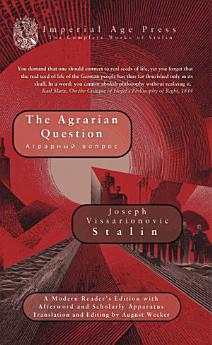The Agrarian Question
About this ebook
This article was published (in a party journal, likely Brdzola or another illegal press) around March 1906. Stalin’s language is urgent and didactic. He outlines the peasants’ demands and arguments and rebuts proposals that preserve any landlord estates. The structure moves from diagnosing the peasant revolt’s strength to a single conclusion: since the peasants themselves are demanding confiscation of all large estates, Marxists should support that demand. He contrasts the old slogan of compensatory partial expropriation (“otrezki”) with the new reality where peasants expect full transfer of land. The piece ends by declaring that it would be reactionary to limit their victories: the peasants must “not bargain with the landlords, but fight them” until “all the land” is won.
Historically, this article was one of the early programmatic statements on land reform in the Russian Social-Democratic movement. It offered a clear response to the peasant question during 1905–06. Within the Bolshevik faction, Stalin’s outright call for blanket land confiscation anticipated the party’s later Sovnarkhoz slogans. After the Revolution, Stalin’s phraseology (“confiscation of all lands”) was used as evidence of a Bolshevik mandate for collectivization – though the actual policy discussion continued to evolve. For scholars, it is significant as Stalin’s first fully developed agrarian position. It made plain that he saw socialist revolution as a joint peasant-proletarian effort, and it laid the groundwork for his later leadership in agricultural policy. (This essay had no alternate title; it is generally referred to simply as “The Agrarian Question.”)
This modern Critical Reader’s Edition includes an illuminating afterword tracing Stalin's intellectual relationships with revolutionary philosophers and politicians (including Hegel, Feuerbach, Engels, and Ricardo), containing unique research into his intellectual development and economic-metaphysical theories, religious impulses masquerading as materialism, a comprehensive timeline of his life and works, a glossary of Lenin-Stalinist terminology, and a detailed index of his work works. Combined with the scholarly amplifying material, this professional translation is an indispensable exploration of Stalin’s world-changing philosophy which he manifested into one of the most terrifying authoritarian regimes ever created.






